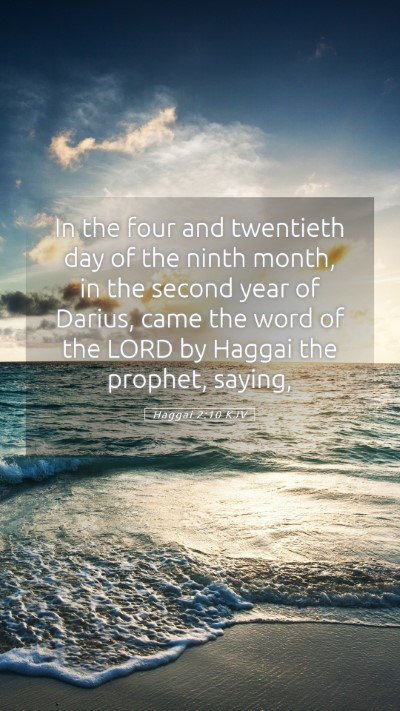Old Testament
Genesis Exodus Leviticus Numbers Deuteronomy Joshua Judges Ruth 1 Samuel 2 Samuel 1 Kings 2 Kings 1 Chronicles 2 Chronicles Ezra Nehemiah Esther Job Psalms Proverbs Ecclesiastes Song of Solomon Isaiah Jeremiah Lamentations Ezekiel Daniel Hosea Joel Amos Obadiah Jonah Micah Nahum Habakkuk Zephaniah Haggai Zechariah MalachiHaggai 2:10 Meaning
What is the meaning of Haggai 2:10?
In the four and twentieth day of the ninth month, in the second year of Darius, came the word of the LORD by Haggai the prophet, saying,
Haggai 2:10 Bible Verse Meaning
Understanding Haggai 2:10
Bible Verse: Haggai 2:10
This verse serves as a profound reflection on the nature of holiness and defilement, and it carries significant theological implications for our lives as believers. Exploring the meanings behind this verse allows us to gain insight into the spiritual lessons that God conveys through His Word.
Bible Verse Meanings
Haggai 2:10 states:
"In the four and twentieth day of the ninth month, in the second year of Darius, came the word of the LORD by Haggai the prophet, saying,"
Bible Verse Interpretations
The timing of Haggai's message, noted in the specific day and month, points to its importance, marking a call to the people of Israel during a pivotal period in their history. This moment involved not just physical rebuilding but a spiritual reawakening among the returned exiles. The mention of Darius indicates the geopolitical context that played a role in the restoration efforts.
Bible Verse Commentary
- Matthew Henry's Commentary: Henry emphasizes that God, in His mercy, addressed the people through Haggai, reminding them not just of their physical tasks but also of their spiritual responsibilities. The verse serves as a mirror reflecting both their spiritual state and God’s promise to restore them.
- Albert Barnes’ Notes: Barnes discusses the implications of this prophetic word, particularly focusing on how holiness is distinct from defilement. He clarifies that mere contact with holy things does not make one holy; rather, holiness must be pursued actively.
- Adam Clarke's Commentary: Clarke provides historical context, highlighting the significance of the timing within the Jewish calendar and linking it to their covenant relationship with God, suggesting a deep call to rectify their spiritual lives aligned with God's purposes.
In-Depth Bible Verse Analysis
Examining Haggai 2:10, we can see the duality of holiness and defilement. It leads to deeper questions about how individuals approach God's presence and the importance of intentionality in our spiritual lives. Understanding this verse is crucial for grasping the broader narrative of restoration and transformation in the Old Testament.
Historical Context of Bible Verses
The historical context is essential for understanding Haggai's message. It is set during the time of rebuilding the temple after the Babylonian exile. The Jewish people had returned to their homeland, but they faced numerous challenges, including discouragement and apathy towards their spiritual commitments.
Application of Bible Verses to Daily Life
In applying Haggai 2:10 to modern life, believers can reflect on what it means to approach God with sincerity and holiness. It prompts questions about how we prioritize our spiritual lives and how we can remain pure in our intentions and actions.
Bible Cross References
- Ezra 5:1-2 - Encouragement to rebuild the temple.
- Isaiah 52:1 - Call to holiness and restoration.
- Zechariah 8:9 - God’s promise to restore His people.
Conclusion
Through the lens of Haggai 2:10, we gain valuable Bible verse insights that transcend mere knowledge. This passage challenges us to examine our spiritual lives in light of our relationship with God. The blend of historical context, theological insights, and practical applications provides a comprehensive framework for understanding this scripture in depth.
Keywords: Bible verse meanings, Bible verse interpretations, Bible study insights, meaning of Bible verses, understanding Scripture.


